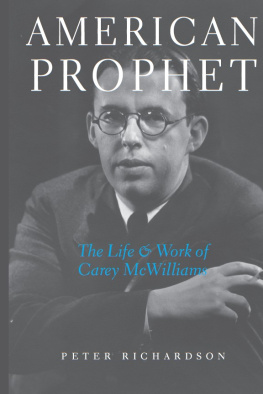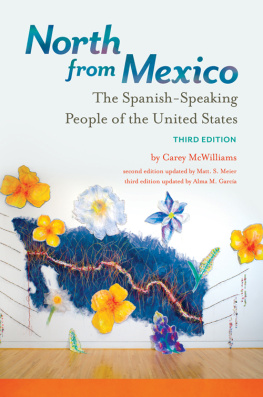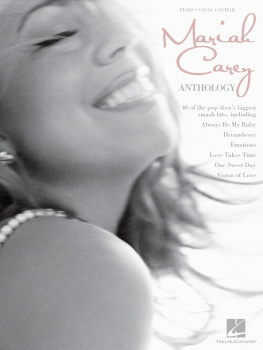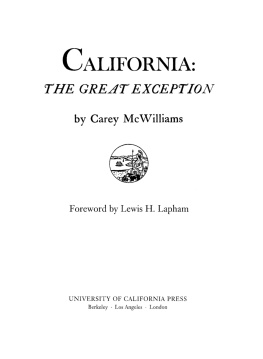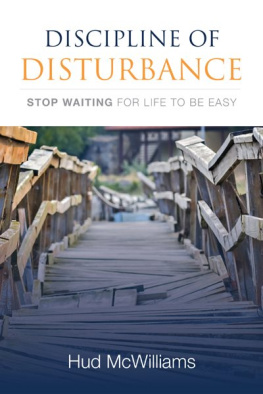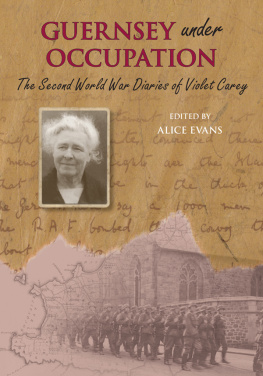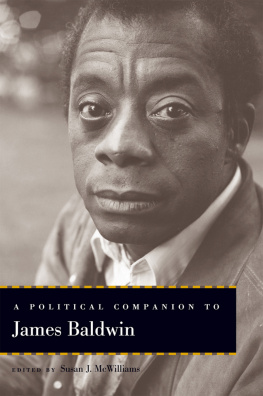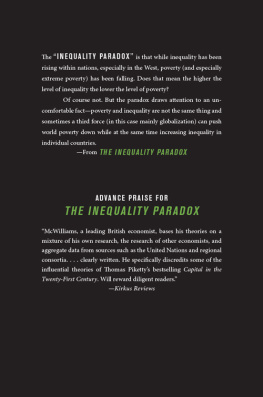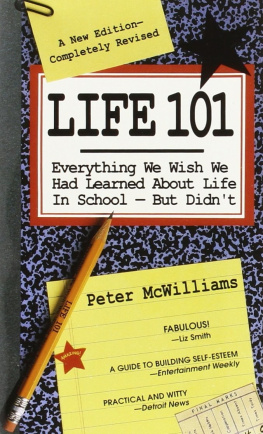McWilliams Carey - American prophet: the life & work of Carey McWilliams
Here you can read online McWilliams Carey - American prophet: the life & work of Carey McWilliams full text of the book (entire story) in english for free. Download pdf and epub, get meaning, cover and reviews about this ebook. City: United States, year: 2019, publisher: University of Michigan Press;University of California Press, genre: Detective and thriller. Description of the work, (preface) as well as reviews are available. Best literature library LitArk.com created for fans of good reading and offers a wide selection of genres:
Romance novel
Science fiction
Adventure
Detective
Science
History
Home and family
Prose
Art
Politics
Computer
Non-fiction
Religion
Business
Children
Humor
Choose a favorite category and find really read worthwhile books. Enjoy immersion in the world of imagination, feel the emotions of the characters or learn something new for yourself, make an fascinating discovery.
- Book:American prophet: the life & work of Carey McWilliams
- Author:
- Publisher:University of Michigan Press;University of California Press
- Genre:
- Year:2019
- City:United States
- Rating:5 / 5
- Favourites:Add to favourites
- Your mark:
- 100
- 1
- 2
- 3
- 4
- 5
American prophet: the life & work of Carey McWilliams: summary, description and annotation
We offer to read an annotation, description, summary or preface (depends on what the author of the book "American prophet: the life & work of Carey McWilliams" wrote himself). If you haven't found the necessary information about the book — write in the comments, we will try to find it.
American prophet: the life & work of Carey McWilliams — read online for free the complete book (whole text) full work
Below is the text of the book, divided by pages. System saving the place of the last page read, allows you to conveniently read the book "American prophet: the life & work of Carey McWilliams" online for free, without having to search again every time where you left off. Put a bookmark, and you can go to the page where you finished reading at any time.
Font size:
Interval:
Bookmark:

Copyright by the University of Michigan 2005
All rights reserved
Published in the United States of America by
The University of Michigan Press
Manufactured in the United States of America Printed on acid-free paper
Printed on acid-free paper
2008 2007 2006 2005 4 3 2 1
No part of this publication may be reproduced, stored in a retrieval system, or transmitted in any form or by any means, electronic, mechanical, or otherwise, without the written permission of the publisher.
A CIP catalog record for this book is available from the British Library.
Library of Congress Cataloging-in-Publication Data
Richardson, Peter, 1959
American prophet : the life and work of Carey McWilliams / Peter Richardson.
p.cm.
Includes bibliographical references and index.
ISBN-13: 978-0-472-11524-2 (cloth : alk. paper)
1. McWilliams, Carey, 1905 2. JournalistsUnited StatesBiography.I. Title.
PN4874.M475R53 2005
070.92dc22 2005012431
ISBN13 978-0-472-02613-5 (electronic)
T HIS BOOK EXAMINES the life, work, and influence of Carey McWilliams: author, attorney, activist, and editor of the Nation from 1955 to 1975. It defines his work broadly to include his many books and articles; his stint in California state government; his efforts on behalf of social, political, and legal causes; and his stewardship of a national magazine. It also considers his personal and professional development, the fierce and sometimes unreckoning resistance to his work, and the remarkable range of friends, associates, and adversaries he accrued over his long career. Finally, it assesses his prodigious literary output, the scope and depth of his influence, and the reasons for his growing reputation in the academy. This assessment leads to a surprising conclusion: that McWilliamswho remains unknown to most readers today, not to mention the culture at largewas one of the most versatile, productive, and consequential American public intellectuals of the twentieth century.
With a dozen books and hundreds of essays and articles to his credit, McWilliams was an astonishingly productive writer. His biography of Ambrose Bierce appeared when he was twenty-four and a full-time attorney. He composed his first best-seller, Factories in the Field (1939), between court dates and by writing nights, weekends, and holidays. In the 1940s alone, he produced seven books, two while heading California's Division of Immigration and Housing (DIH). Half of his books are still in print, and most continue to attract the highest critical praise. Author and California state librarian emeritus Kevin Starr has called McWilliams the state's most astute political observer and the single finest non-fiction writer on Californiaever. Arthur Schlesinger Jr., no friend of McWilliams, considered the Bierce biography excellent and three other books (Factories in the Field, Brothers Under the Skin, and North from Mexico)first-rate. Historian Gerald Nash has called California: The Great Exception (1949) a minor classic, and Southern California Country: An Island on the Land (1946) is still regarded as the best interpretive history of the Los Angeles area.
McWilliams was as influential as he was productive. Csar Chvez credited much of his understanding of California agribusiness to McWilliams. Southern California Country inspired Robert Towne's original screenplay for Chinatown (1974), perhaps the most widely admired Hollywood film of its generation, and Luis Valdez's play Zoot Suit (1979) was drawn directly from North from Mexico (1948). When Prejudice appeared in 1944, a Supreme Court dissenting opinion cited it four times in the landmark Korematsu v. United States case, which upheld the constitutionality of the Japanese-American internment during the Second World War. McWilliams's influence can also be seen in the work of Kevin Starr, urban critic Mike Davis, writer John Gregory Dunne, Reagan biographer Lou Cannon, and countless journalists who continue to cite him extensively. In the academy, too, McWilliams's presence registers in such diverse fields as ethnic studies, labor history, and urban planning. In 1993, Patricia Nelson Limerick, a leading historian of the American West, observed that her field was still catching up to McWilliams's work of forty years earlier.
At least some of McWilliams's influence can be traced to his impressive network. Although he began writing as an alienated outsider, he eventually became one of the best-connected writers and editors in the country. Over his fifty-year career, he came to know such diverse figures as H. L. Mencken and Martin Luther King Jr., Mary Austin and Jerry Brown, Robinson Jeffers and Orson Welles, Edmund Wilson and Harry Bridges, Arthur Miller and Alger Hiss, and Upton Sinclair and Eugene McCarthy. At the Nation, he also published talented younger writers who would go on to reach even larger audiences, including Ralph Nader, Hunter S. Thompson, counterculture observer Theodore Roszak, and social historian Howard Zinn. At every stage of his career, McWilliams showed a remarkable knack for identifying and working productively with talented writers, editors, and public figures.
Most of McWilliams's appeal now, however, can be traced to his authorial strengths, especially his lucidity, range, and powers of observation. His ability to see social patterns steadily and whole led him to topics that otherwriters would neglect until their significance was more obvious. As Michael Teitz observed recently about California: The Great Exception, McWilliams was immensely perceptive about agriculture and social relations around immigration; he understood the multicultural nature of California's population long before the word was invented; and he appreciated California's remarkable ability to remake itself both as a society and as an engine of economic development. For these reasons, his observations still pertain to a state that has experienced dramatic changes since the 1940s, when he wrote most of his books. Indeed, few have done more than McWilliams to change the way people write, think, and make films about California. At the national level, too, he probed issues that others could not see or would not explore. As journalist Nicholas von Hoffman observed, McWilliams didn't cash in on trends; he made them.
Another source of McWilliams's continuing appeal is the sanity of his judgments. He condemned the exploitation of migratory farmworkers in the 1930s and helped reverse the unjust murder convictions of Latino youths following their sensational (and patently biased) Los Angeles trial in the 1940s. He challenged the evacuation and internment of Japanese-American citizens during the Second World War and pointed out Congressman Richard Nixon's astonishing capacity for petty malice in 1950. He called for federal protections against racial discrimination throughout the 1940s, helped defend the Hollywood Ten, stoutly resisted McCarthy-ism, and was an early critic of the Vietnam War. Most Americans would eventually come around to his positions, which he supported with measured reviews of the key facts. The Supreme Court, too, would eventually accept his arguments about the Japanese-American internment, the Hollywood Ten's First Amendment rights, and federal protections against discrimination. In this sense, he earned the title of American prophet many times over.
When first offered, however, McWilliams's judgments earned him powerful enemies. In 1938, the House Committee on Un-American Activities (HUAC) identified him as a radical for his role in organizing the Western Writers Congress. Following the publication of
Font size:
Interval:
Bookmark:
Similar books «American prophet: the life & work of Carey McWilliams»
Look at similar books to American prophet: the life & work of Carey McWilliams. We have selected literature similar in name and meaning in the hope of providing readers with more options to find new, interesting, not yet read works.
Discussion, reviews of the book American prophet: the life & work of Carey McWilliams and just readers' own opinions. Leave your comments, write what you think about the work, its meaning or the main characters. Specify what exactly you liked and what you didn't like, and why you think so.

